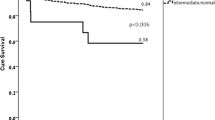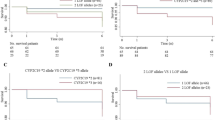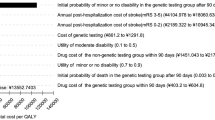Abstract
Clopidogrel resistance is prevalent in chronic kidney disease (CKD) patients. Genetic polymorphism is considered to be the most important factor that influences clopidogrel resistance. Limited data exist as to the role of pharmacogenetics in prognosis of stroke patients with impaired renal function on clopidogrel. We sought to explore whether decreased kidney function alters the association between CYP2C19 genetic variants and clinical outcome in patients with minor stroke or transient ischemic attack (TIA) receiving clopidogrel therapy. A total of 1476 participants on clopidogrel-aspirin treatment with genotyping results in High-Risk Patients with Acute Nondisabling Cerebrovascular Events (CHANCE) trial were categorized by quintiles of renal function estimated by estimated glomerular filtration rate (eGFR), and were stratified according to the possession of CYP2C19 loss-of-function (LOF) alleles: carriers and non-carriers. Patients were followed up and clinical outcomes were evaluated. The primary efficacy outcome was new stroke. The secondary efficacy outcome was combined vascular events (ischemic stroke, hemorrhagic stroke, myocardial infarction, or vascular death). The safety outcome was bleeding event. CYP2C19 LOF carriers had higher odds of new stroke than non-carriers (10.4% versus 2.4 %, hazard ratio [HR], 5.30; 95% CI, 1.51–18.3, P = 0.009) in the lowest quintile of renal function group with eGFR < 75 ml/min/1.73 m2 but not in the other four higher quintiles. Similar results were observed for the ischemic stroke and combined vascular events. There was no significant difference in the individual outcomes of bleeding in carriers compared with non-carriers in any renal function group. Among patients with minor stroke or TIA taking clopidogrel-aspirin treatment, CYP2C19 LOF carrier state was associated with higher risk of new stroke in those with eGFR < 75 ml/min/1.73 m2. This observation supports that the evaluation of CYP2C19 LOF carrier state may be useful for identification of the patients with kidney impairment with greater likelihood of having worse outcomes.
This is a preview of subscription content, access via your institution
Access options
Subscribe to this journal
Receive 6 print issues and online access
$259.00 per year
only $43.17 per issue
Buy this article
- Purchase on Springer Link
- Instant access to full article PDF
Prices may be subject to local taxes which are calculated during checkout
Similar content being viewed by others
References
Chen CY, Lee KT, Lee CT, Lai WT, Huang YB. Effectiveness and safety of antiplatelet in stroke patients with end-stage renal disease undergoing dialysis. Int J Stroke. 2014;9:580–90.
Mostofsky E, Wellenius GA, Noheria A, Levitan EB, Burger MR, Schlaug G, et al. Renal function predicts survival in patients with acute ischemic stroke. Cerebrovasc Dis. 2009;28:88–94.
Htun P, Fateh-Moghadam S, Bischofs C, Banya W, Muller K, Bigalke B, et al. Low responsiveness to clopidogrel increases risk among CKD patients undergoing coronary intervention. J Am Soc Nephrol. 2011;22:627–33.
Steinhubl SR. Genotyping, clopidogrel metabolism, and the search for the therapeutic window of thienopyridines. Circulation. 2010;121:481–3.
Baber U, Mehran R, Kirtane AJ, Gurbel PA, Christodoulidis G, Maehara A, et al. Prevalence and impact of high platelet reactivity in chronic kidney disease: results from the Assessment of Dual Antiplatelet Therapy with Drug-Eluting Stents registry. Circ Cardiovasc Interv. 2015;8:e001683.
Leblond F, Guevin C, Demers C, Pellerin I, Gascon-Barre M, Pichette V. Downregulation of hepatic cytochrome P450 in chronic renal failure. J Am Soc Nephrol. 2001;12:326–32.
Dreisbach AW, Lertora JJ. The effect of chronic renal failure on drug metabolism and transport. Expert Opin Drug Metab Toxicol. 2008;4:1065–74.
Ladda MA, Goralski KB. The effects of CKD on cytochrome P450-mediated drug metabolism. Adv Chronic Kidney Dis. 2016;23:67–75.
Barnes KJ, Rowland A, Polasek TM, Miners JO. Inhibition of human drug-metabolising cytochrome P450 and UDP-glucuronosyltransferase enzyme activities in vitro by uremic toxins. Eur J Clin Pharmacol. 2014;70:1097–106.
Wang Y, Wang Y, Zhao X, Liu L, Wang D, Wang C, et al. Clopidogrel with aspirin in acute minor stroke or transient ischemic attack. N Engl J Med. 2013;369:11–19.
Wang Y, Pan Y, Zhao X, Li H, Wang D, Johnston SC, et al. Clopidogrel with aspirin in acute minor stroke or transient ischemic attack (CHANCE) trial: one-year outcomes. Circulation. 2015;132:40–46.
Wang Y, Johnston SC. Rationale and design of a randomized, double-blind trial comparing the effects of a 3-month clopidogrel-aspirin regimen versus aspirin alone for the treatment of high-risk patients with acute nondisabling cerebrovascular event. Am Heart J. 2010;160:380–6 e381.
Teo BW, Xu H, Wang D, Li J, Sinha AK, Shuter B, et al. GFR estimating equations in a multiethnic Asian population. Am J Kidney Dis. 2011;58:56–63.
Wang Y, Zhao X, Lin J, Li H, Johnston SC, Lin Y, et al. Association between CYP2C19 loss-of-function allele status and efficacy of clopidogrel for risk reduction among patients with minor stroke or transient ischemic attack. JAMA. 2016;316:70–78.
The GUSTO investigators. An international randomized trial comparing four thrombolytic strategies for acute myocardial infarction. N Engl J Med. 1993;329:673–82.
Zhou Y, Pan Y, Wu Y, Zhao X, Li H, Wang D, et al. Effect of estimated glomerular filtration rate decline on the efficacy and safety of clopidogrel with aspirin in minor stroke or transient ischemic attack: CHANCE substudy (Clopidogrel in High-Risk Patients With Acute Nondisabling Cerebrovascular Events). Stroke. 2016;47:2791–6.
Angiolillo DJ, Fernandez-Ortiz A, Bernardo E, Alfonso F, Macaya C, Bass TA, et al. Variability in individual responsiveness to clopidogrel: clinical implications, management, and future perspectives. J Am Coll Cardiol. 2007;49:1505–16.
Morel O, El Ghannudi S, Jesel L, Radulescu B, Meyer N, Wiesel ML, et al. Cardiovascular mortality in chronic kidney disease patients undergoing percutaneous coronary intervention is mainly related to impaired P2Y12 inhibition by clopidogrel. J Am Coll Cardiol. 2011;57:399–408.
Gremmel T, Muller M, Steiner S, Seidinger D, Koppensteiner R, Kopp CW, et al. Chronic kidney disease is associated with increased platelet activation and poor response to antiplatelet therapy. Nephrol Dial Transplant. 2013;28:2116–22.
Viviani Anselmi C, Briguori C, Roncarati R, Papa L, Visconti G, Focaccio A, et al. Routine assessment of on-clopidogrel platelet reactivity and gene polymorphisms in predicting clinical outcome following drug-eluting stent implantation in patients with stable coronary artery disease. JACC Cardiovasc Interv. 2013;6:1166–75.
Tornio A, Flynn R, Morant S, Velten E, Palmer CNA, MacDonald TM, et al. Investigating real-world clopidogrel pharmacogenetics in stroke using a bioresource linked to electronic medical records. Clin Pharmacol Ther. 2017;103:281–6.
Pan Y, Chen W, Xu Y, Yi X, Han Y, Yang Q, et al. Genetic polymorphisms and clopidogrel efficacy for acute ischemic stroke or transient ischemic attack: a systematic review and meta-analysis. Circulation. 2017;135:21–33.
Tabata N, Hokimoto S, Akasaka T, Arima Y, Kaikita K, Kumagae N, et al. Chronic kidney disease status modifies the association of CYP2C19 polymorphism in predicting clinical outcomes following coronary stent implantation. Thromb Res. 2014;134:939–44.
Yang J, Zhao HD, Tan J, Ding YL, Gu ZQ, Zou JJ. CYP2C19 polymorphism and antiplatelet effects of clopidogrel in Chinese stroke patients. Pharmazie. 2013;68:183–6.
Jia DM, Chen ZB, Zhang MJ, Yang WJ, Jin JL, Xia YQ, et al. CYP2C19 polymorphisms and antiplatelet effects of clopidogrel in acute ischemic stroke in China. Stroke. 2013;44:1717–9.
Linthorst GE, Folman CC, van Olden RW, von dem Borne AE. Plasma thrombopoietin levels in patients with chronic renal failure. Hematol J. 2002;3:38–42.
Park SH, Kim W, Park CS, Kang WY, Hwang SH, Kim W. A comparison of clopidogrel responsiveness in patients with versus without chronic renal failure. Am J Cardiol. 2009;104:1292–5.
Pattaro C, Teumer A, Gorski M, Chu AY, Li M, Mijatovic V, et al. Genetic associations at 53 loci highlight cell types and biological pathways relevant for kidney function. Nat Commun. 2016;7:10023.
Mega JL, Close SL, Wiviott SD, Shen L, Hockett RD, Brandt JT, et al. Cytochrome p-450 polymorphisms and response to clopidogrel. N Engl J Med. 2009;360:354–62.
Funding
This study is supported by grants from the Ministry of Science and Technology of the People’s Republic of China (2013BAI09B03, 2013BAI09B14, 2015BAI12B04, 2015BAI12B02), a grant from the Beijing Biobank of Cerebral Vascular Disease (D131100005313003), a grant from Beijing Institute for Brain Disorders (1152130306), a grant from the National Natural Science Foundation of China (No. 81322019), grants from Beijing Municipal Science and Technology Commission (No. D131100002313002, D151100002015001, D151100002015002, D151100002015003, Z15110200390000, Z151100003915117), a grant from Beijing high-level talents in health-care system (2014-3-021), grants from Beijing Municipal Commission of Health and Family Planning (No. 2016-1-2041, SML20150502).
Author information
Authors and Affiliations
Consortia
Corresponding authors
Ethics declarations
Conflict of interest
The authors declare that they have no conflict of interest.
Rights and permissions
About this article
Cite this article
Wu, Y., Zhou, Y., Pan, Y. et al. Impact of CYP2C19 polymorphism in prognosis of minor stroke or TIA patients with declined eGFR on dual antiplatelet therapy: CHANCE substudy. Pharmacogenomics J 18, 713–720 (2018). https://doi.org/10.1038/s41397-018-0018-4
Received:
Revised:
Accepted:
Published:
Issue Date:
DOI: https://doi.org/10.1038/s41397-018-0018-4



